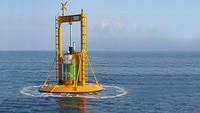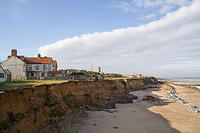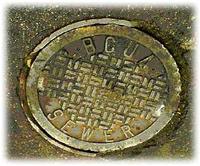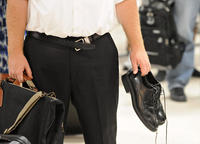-
Boeing to pursue cybersecurity opportunities in Japan
Boeing and Japanese trading company Sojitz are teaming up to offer advanced cybersecurity solutions in Japan to help protect critical government, civil, and commercial information technology infrastructure
-
-
Nexans shows its anti-theft cable solutions

Nexans is showing its new anti-theft cable solutions at InnoTrans, which opened yesterday in Berlin; the solution promises to help network operators reduce the high volume of copper cables theft along their railway networks
-
-
Hurricane Isaac tests Loyola University's emergency response plans
In the days following Hurricane Isaac’s slow march across south Louisiana, Loyola University New Orleans administrators have been reviewing their response with a critical eye to ensure emergency preparations continue to evolve and meet the demands of each situation; beginning Tuesday, 28 August, New Orleans felt the first of Isaac’s high winds and heavy rains – but Loyola University was ready
-
-
Next generation of advanced climate models needed
From farmers deciding which crops to plant next season, to mayors preparing for possible heat waves, to insurance companies assessing future flood risks, to those responsible for infrastructure protection having to decide how best to use scarce resource to mitigate climate change-induced disasters, an array of stakeholders from the public and private sectors rely on and use climate information; the U.S. National Research Council says he U.S. collection of climate models should advance substantially to deliver more detailed, smaller scale climate projections
-
-
Urchin-loving otters can help fight global warming

A thriving sea otter population that keeps sea urchins in check will in turn allow kelp forests to prosper; the spreading kelp can absorb as much as twelve times the amount of CO2 from the atmosphere than if it were subject to ravenous sea urchins
-
-
Protecting buildings from earthquakes by hiding them

Engineers have come up with an inventive and exciting idea for protecting buildings from earthquakes: hide them (the buildings, that is); the engineers say that placing specialized rubber under the building would diverts certain temblor shock waves, leaving the building virtually untouched by them
-
-
Crack-resistant components for bridges, roof structures, cars
Bridges, roof structures, cars, and more should become increasingly lighter, with the same stability, and thus save energy and materials; the new high-strength steel is superbly suited for the needed lightweight design because it can also withstand extremely heavy stresses; yet these materials also have a disadvantage: with increasing strength, their susceptibility to cold cracking rises when welded; cracks are difficult to predict — until now
-
-
Destroyed coastal habitats produce significant amounts of greenhouse gas

Destruction of coastal habitats may release as much as one billion tons of carbon into the atmosphere each year, ten times higher than previously reported; a new analysis provides the most comprehensive estimate of global carbon emissions from the loss of these coastal habitats to date: 0.15 to 1.2 billion tons; it suggests there is a high value associated with keeping these coastal-marine ecosystems intact as the release of their stored carbon costs roughly $6-$42 billion annually
-
-
DHS funds more tests of autonomous power buoy for ocean surveillance

Ocean Power Technologies (OPT) has entered into an agreement with DHS Science & Technology Directorate to perform a new round of in-ocean tests on the company’s Autonomous PowerBuoy to demonstrate its use for ocean surveillance
-
-
Cloud OS for the U.S. intelligence community
Cloud management specialist Adaptive Computingis partnering with the investment arm of the CIA, In-Q-Tel, to develop a cloud operating system for use by U.S. intelligence agency
-
-
Coastline erosion due to rise in sea level greater than previously thought

The effects of coastline erosion as a result of rising sea-level rise can be measured by acceptable engineering tools, but such an erosion in the vicinity of inlets, such as river estuaries, has until now been underestimated – and more difficult to calculate; scientists have develop a new model to calculate this more complex erosion, making a valuable contribution to coastal management, planning, and infrastructure protection
-
-
Many of the U.S. 20 million manholes are in need of immediate rehabilitation or replacement

The EPA estimates that there are about twenty million manholes in the United States – or one manhole for every 400 feet of pavement on average; many of those manholes are in serious decay or in need of immediate rehabilitation or replacement
-
-
Testing new pavement materials
Scientists are trying to determine the durability of recycled materials for use in road construction; a Texas university is building a new accelerated pavement testing center, with the overall road pad at the accelerated pavement testing center could be a little bigger than a half-acre in size
-
-
MIT expert: “toxic” political discussions limit climate response
In a talk at the Sandia National Lab, an MIT expert says the inability of natural and social scientists to convince political leaders that “we’re spinning a roulette wheel over climate change” puts humanity at “extreme risk,” and that the difficulties in using science to push for mitigation strategies are more political than scientific
-
-
As shoe-scanning devices fail, passengers continue to remove their shoes

In the last five years the U.S. government has tested several scanning devices for detecting explosives and other weapons concealed in the shoes of airline passengers; after spending millions of dollars on these devices, TSA has concluded that the detection systems are ineffective; the result: removing shoes at security check points is going to be a part of air travel for the foreseeable future
-
- All
- Regional
- Water
- Biometrics
- Borders/Immig
- Business
- Cybersecurity
- Detection
- Disasters
- Government
- Infrastructure
- International
- Public health
- Public Safety
- Communication interoperabillity
- Emergency services
- Emergency medical services
- Fire
- First response
- IEDs
- Law Enforcement
- Law Enforcement Technology
- Military technology
- Nonlethal weapons
- Nuclear weapons
- Personal protection equipment
- Police
- Notification /alert systems
- Situational awareness
- Weapons systems
- Sci-Tech
- Sector Reports
- Surveillance
- Transportation
Advertising & Marketing: advertise@newswirepubs.com
Editorial: editor@newswirepubs.com
General: info@newswirepubs.com
2010-2011 © News Wire Publications, LLC News Wire Publications, LLC
220 Old Country Road | Suite 200 | Mineola | New York | 11501
Permissions and Policies
Editorial: editor@newswirepubs.com
General: info@newswirepubs.com
2010-2011 © News Wire Publications, LLC News Wire Publications, LLC
220 Old Country Road | Suite 200 | Mineola | New York | 11501
Permissions and Policies
